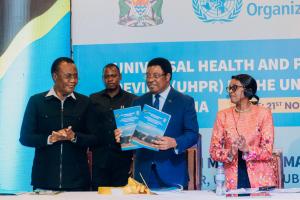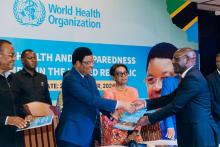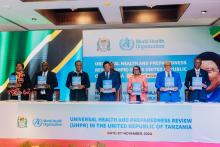Tanzania launches review of its preparedness for future health shocks
Dar es Salaam –Tanzania has successfully completed a review of its health emergency preparedness capacity, becoming the 5th (Central Africa Republic, Sierra Leone, Republic of Congo, Cameroon, Tanzania) African country, and the 8th globally, to officially evaluate its ability to respond to future health shocks.
Hon Kassim Majaliwa Majaliwa, (MP), the Prime Minister of United Republic of Tanzania, launched the National Universal Health and Preparedness Review (UHPR), a voluntary assessment designed to bolster health emergency preparedness and response while building health system capacity to deliver quality universal health care.
"Through this inclusive and collaborative conference, our nation will continue to be more stable in response to various emergencies”, said Hon Kassim Majaliwa Majaliwa (MP) “The government promises to manage and continue to implement the good things outlined the best practices, addressing challenges identified and establishing effective strategies to prioritize governance, performance, and financial resources."
Following the success of the process in the Central African Republic, Iraq, Portugal, Thailand, and, most recently, Sierra Leone, Republic of Congo, Cameroun the mechanism sees Tanzania commit to voluntary, regular, and transparent peer reviews of its national health emergency preparedness capacities.
“The Universal Health and Preparedness Review is an opportunity to ensure the government and the whole community collaborate in implementing health for all and preparedness against emergencies”, said Hon. Jenista J. Mhagama (PM), Minister of Health in Tanzania. “This inclusive and integrated assessment identifies areas where we are doing well and creates opportunities to address gaps and exchange experiences with other countries on health and disaster emergency readiness.”
WHO Director General Dr Tedros Adhanom Ghebreyesus unveiled the strategy in 2020, urging all Member States to participate to identify gaps in capacity, share best practices, and help mobilize support where it is most needed. "This historic launch reflects Tanzania's leadership and commitment to safeguarding the health of its people and protecting the national economy from health shocks and contributing to the health security of Africa and the global community,” said Dr Matshidiso Moeti, WHO Regional Director for Africa.
Despite the disruptions caused by the COVID-19 pandemic, Tanzania has made notable strides in health emergency preparedness and response to several health threats, including malaria, polio, cholera, and measles. The country also ended its first-ever outbreak of Marburg Virus Disease in June 2023, after just more than two months.
The achievement was the result of Tanzania mobilizing support from partners and stakeholders to rapidly implement measures to quickly break the chain of transmission and manage affected cases to reduce mortality and morbidity while ensuring continuity of health services.
WHO supported the Ministry of Health with coordination, surveillance, contact tracing, identification and management of cases, and infection prevention and control. Technical officers were also deployed to support coordination and surveillance activities.
In December 2023, WHO and the Government of Ireland signed an agreement to pilot a year-long project to help strengthen health system resilience in nine high-risk regions. The fundamental aim is to bolster the health system’s capacity to respond to health emergencies, emerging diseases, climate change impacts, and natural disasters. This initiative underscores a shared commitment to enhancing health security and protecting vulnerable populations in the face of evolving global health challenges.


